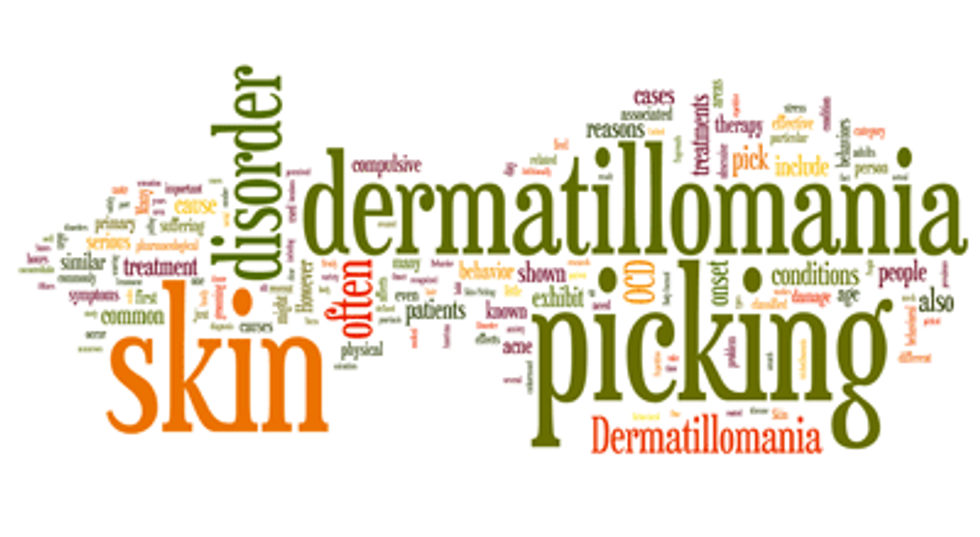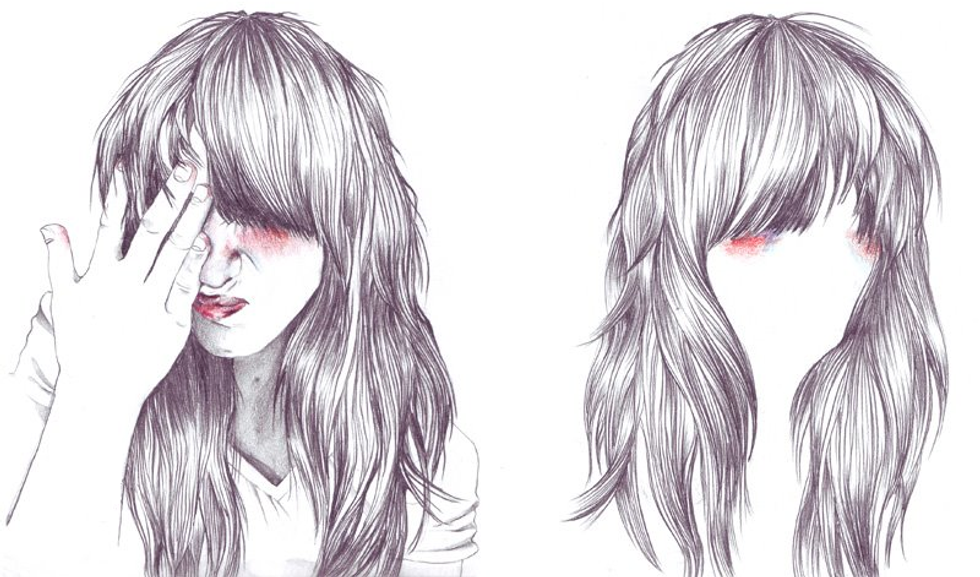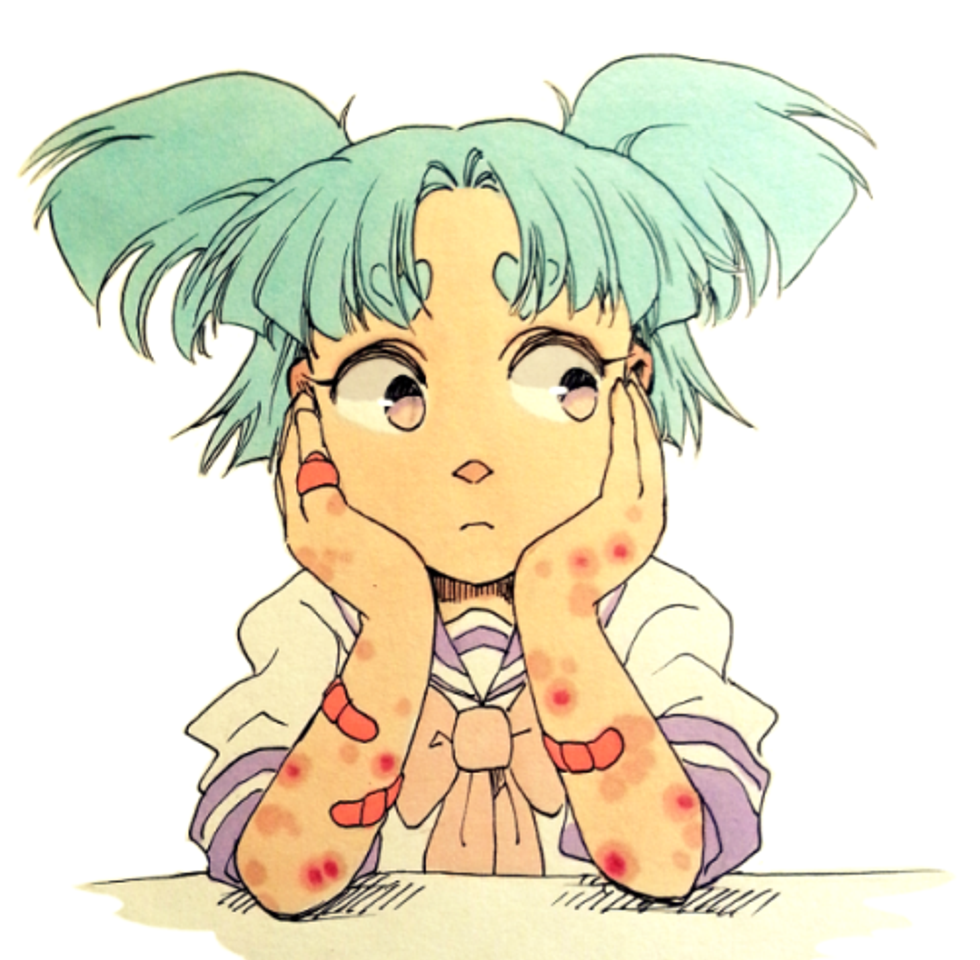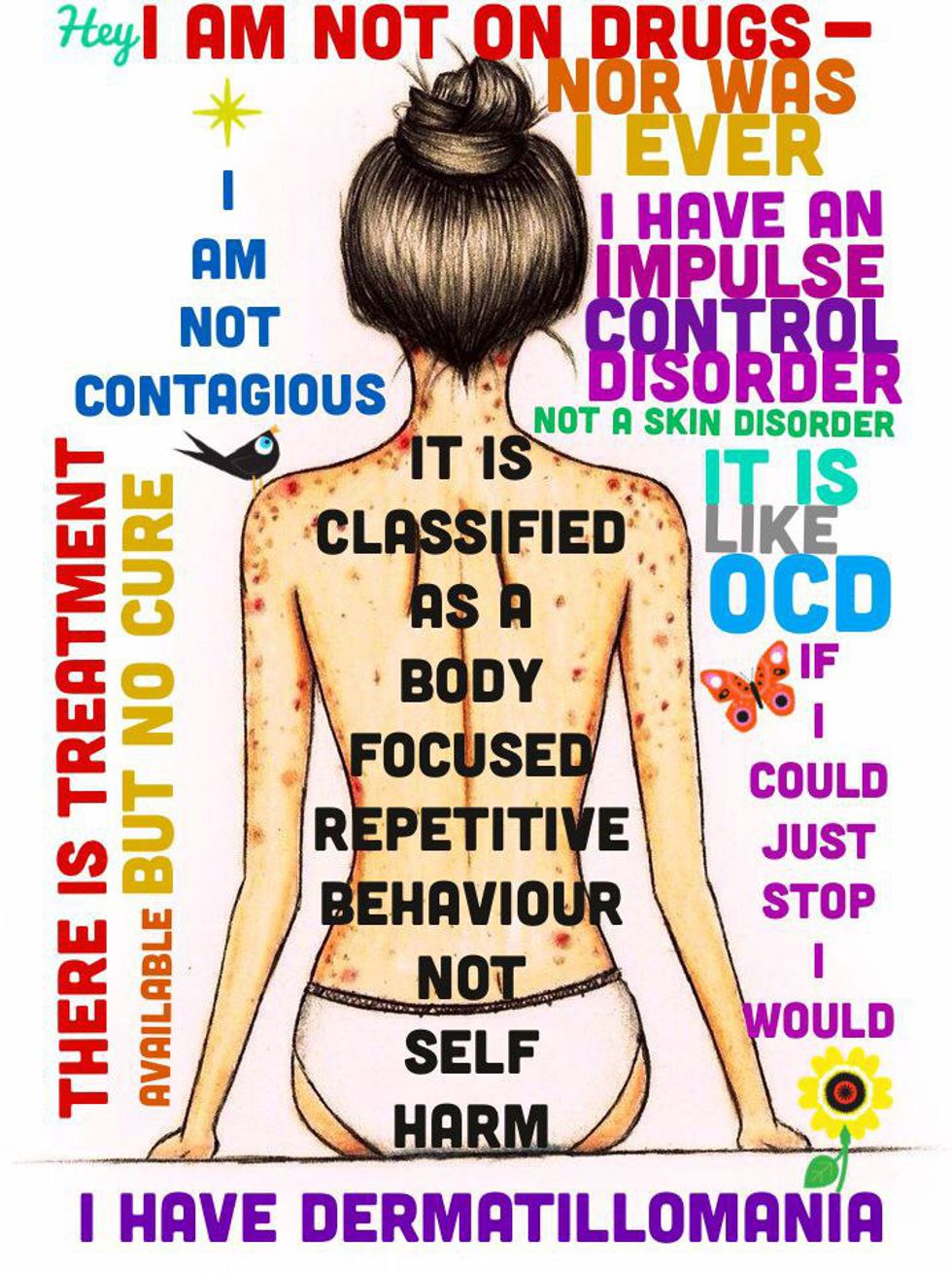Trigger warning (TW): suicide, blood
In our society, there is still a lot of stigma surrounding mental illnesses, which causes people to be afraid of seeking help or even admitting that they have a problem. This stigma and fear can be very detrimental because when victims refuse to see a professional about their mental health, especially for lesser known disorders, then it becomes more difficult to study the illness and find working treatments.
Such is the case for dermatillomania, the fairly common yet rarely discussed skin-picking disorder. Classified as a Body-Focused Repetitive Behavior, this disorder involves compulsive and repetitive picking of the skin that results in tissue damage, such as scarring. Minor forms of it are concentrated in the picking of cuticles and finger nails, but the skin-picking can occur also on the face, chest, legs, and really almost everywhere as it gets worse. Dermatillomania is often confused with trichotillomania, the hair-pulling disorder, because both are very similar in that they are ritualistic, do not need preceding obsessions, and have mutual triggers. The most common onset of this behavior is acne during teenage years, but it can also stem from skin conditions like eczema. Dermatillomania has been linked to Obsessive Compulsive Disorder, Anxiety Disorder, and Body Dismorphic Disorder.
Dermatillomania is found in two to three percent of the general world population, mostly in women. However, this is only the reported number. In reality, the percentage is probably much higher because, while the disorder is prevalent, many cases go unreported due to the shame that comes with the stigma of mental illness, as well as the lack of information available from the public and media about it. Moreover, 30 to 45 percent of dermatillomania cases go untreated. Because of this, there have not been any confirmed treatments that can actually cure this disorder. Rather, there have only been reported methods that help alleviate the behavior, but not eradicate it. These methods include pharmalogical treatment using Selective Serotonin Reuptake Inhibitors and various forms of behavioral therapy. There is also no singular known cause for dermatillomania because it varies amongst individuals due to hereditary factors, other mental illnesses like anxiety, stress levels, and drug usage. Many scientists do, however, agree that the cause is rooted neurologically and can result from repressed emotions.
You may be wondering why I am extensively describing this particular mental disorder. Well, it’s because I have dermatillomania. I have been battling with these compulsive skin-picking behaviors since I was 13 years old. It began the summer before I entered the eighth grade: as a preteen, I was getting acne and because I had always seen my mother popping her pimples, I felt that this was the best way to rid my skin of impurities. However, the popping and picking at zits became obsessive. I began to see bumps and irregularities where there was nothing. It escalated so quickly that what I assumed was just a “bad habit” took over my life right before my eyes.
Middle school and the underclassmen years of high school were when the disorder was at its worst. My legs, face, shoulders, and especially my chest would be covered in bloody lesions that were painful and difficult to cover. I had already been struggling with anxiety and body image issues since childhood, but the dermatillomania made it so much worse. Not only was I constantly worrying about my weight, but now I hated my skin, too. I could not understand why I was doing this; I felt like a freak. At one point, the weight of the anxiety and dermatillomania, the lack of any real emotional support, and the pressure of constantly trying to hide it caused me to develop suicidal thoughts, particularly in the eighth grade when it was probably at its worst. After all, 11.5 percent of people with dermatillomania have reportedly attempted suicide as a consequence of the disorder. I was young, terrified, and could not control my own body. I just wanted it to end, but I also desperately wanted to get better. I hated myself for this behavior, but in the end I was too scared to make any actual suicide attempts.
Why did I continue the behavior of skin-picking, even though it was causing me so much grief? Well, when I pick at my skin, it is not a completely voluntary action. Rather, my mind and body feel compelled to do it; I go into almost a trance-like state and I am not fully aware of my behavior. When picking, I feel as if I am squeezing out impurities from my skin and making myself clean, as ridiculous as that sounds. Moreover, picking functions as a source of stress-relief. Dermatillomania has been linked to dopamine, a neurotransmitter responsible for movement, thought process, and rewarding sensations. Therefore, because the disorder is connected with rewarding sensations, it reduces my often anxiety-induced stress by making me feel calm and accomplished.
I’m happy to say that I have improved so much over the years. Right now is probably the best I have ever been regarding this awful disorder. While my picking has by no means stopped, and still occurs daily, the intensity at which I pick has gone down significantly. I no longer tear at my skin until it bleeds and when I pick, it’s usually only about five minutes or less at a time, which might only occur once or twice a day. My picking is concentrated now mainly to just my face, but in small degrees. I only let myself go to town on blackheads, which never end up scarred and bloody for me, as well as some forehead acne. Of course, I do have stronger problem periods, particularly when I am under a lot of stress, but, for the most part, I am much better. My scars have healed to the point where they aren’t very noticeable. While it isn’t a perfect situation, I’m still proud of myself for the improvements I have made. To be honest, I don’t even dislike my scars. Rather, I see them as a symbol of the pain I have overcome at the hands of this disorder.
Improvement is not an easy process. It requires a lot of self-care and deep analysis of your body and what it goes through during and before the skin-picking trance. You need to fully examine your life to find out what triggers the picking and what actions you can take to make it harder to fulfill these compulsive behaviors. This was even harder for me because I did not know what was wrong with me in the first place or how to go about helping myself. Therefore, I want to provide a brief list of some methods that have helped me pick less and/or feel more confident despite having dermatillomania.
1. Understand your mental illness.
Honestly, I did not find out until my senior year via a random Tumblr post what dermatillomania even was. I had not heard of the term at all in my life, even in the brief time that I did actually see a therapist and a counselor. But, once you can put a name to your disorder, it is important to research in-depth the causes, symptoms, and treatment options. The first step to improvement is to understand what is happening to you in the first place. My real progress did not begin until I realized that what I had was not bizarre and freaky, but actually a real disorder found in many people.
2. Talk about it.
The worst thing for me about dermatillomania was constantly hiding it. This caused me to bottle up my emotions and it made my anxiety worse. Once I opened up to my close friends about it, they were able to offer me the emotional support I needed to admit my problem and seek advice during the worse moments. Whether it’s with a therapist, family, or even just friends, please talk about it and allow yourself to rely on others because the feeling of isolation is the biggest detriment.
3. Keep yourself busy.
While stress does seem to be the main trigger for skin-picking, my dermatillomania has progressed to the point where I will do it just out of boredom. Trying to keep myself constantly busy leaves me next to no time to really think about picking at skin, let alone actually do it.
4. Dorms and bad lighting are blessings in disguise.
Having a roommate makes it difficult to pick at my skin in privacy. After all, because I am ashamed of this behavior, I wouldn’t dare actually do it in front of her. Plus, the awful lighting in the dorms (looking at you GJW) makes it very difficult to make out the bumps and pores on your face. If you can’t clearly see these miniscule flaws, then it’s harder to pick at them.
5. Avoid looking into the bathroom mirror for too long.
This sounds stupid, but think about it. The bathroom usually has bright, fluorescent lighting that makes visible practically every pore on your face. Thank goodness I use a communal restroom where it is impossible to pick at my skin in privacy for long periods of time.
6. Replace it with another bad habit.
This obviously isn’t the best way to go, but it works a lot. For instance, in order to satisfy the picking cravings and the need to keep my hands occupied, I reverted back to my childhood habit of twirling my hair, a habit which had been almost gone before this new disorder. While the twirling does damage my hair a bit, I’d rather deal with some split ends than more scars.
7. Invest in some good foundation and concealer.
Okay, caking your face in makeup does not seem like the best way to go, especially since it plays back into the idea of hiding the effects of your mental illness. But, improving my makeup skills and using the right products did boost my confidence greatly because I was able to cover up the scars, scabs, and other evidence. Although you shouldn’t rely on makeup constantly, having at least a nice, full coverage foundation (I personally prefer the Born This Way collection from Too Faced) on your worst days can help your self-esteem and make you feel "normal."
8. Wash your face (and wherever else you pick).
Keeping your skin clean and clear helps minimize acne, and therefore the amount you pick. Plus, using different cleansers and scrubs helps emulate the feeling of ridding your skin of impurities so that you don’t need to pick at all. This is very important, especially if you do wear makeup.
This list is, however, based solely on my personal experiences and a college dorm lifestyle, so naturally these methods won’t work for everyone. I simply wanted to offer some guidance and advice for those who have dermatillomania and are still learning how to cope with it so that they won’t feel as lost and alone as I did. If you have dermatillomania, you are so strong and beautiful. You are not a freak, and you are not alone in this. This disorder does not define you as a person, so please do not be afraid to get the help you need so that you can be in control of your own life.

























